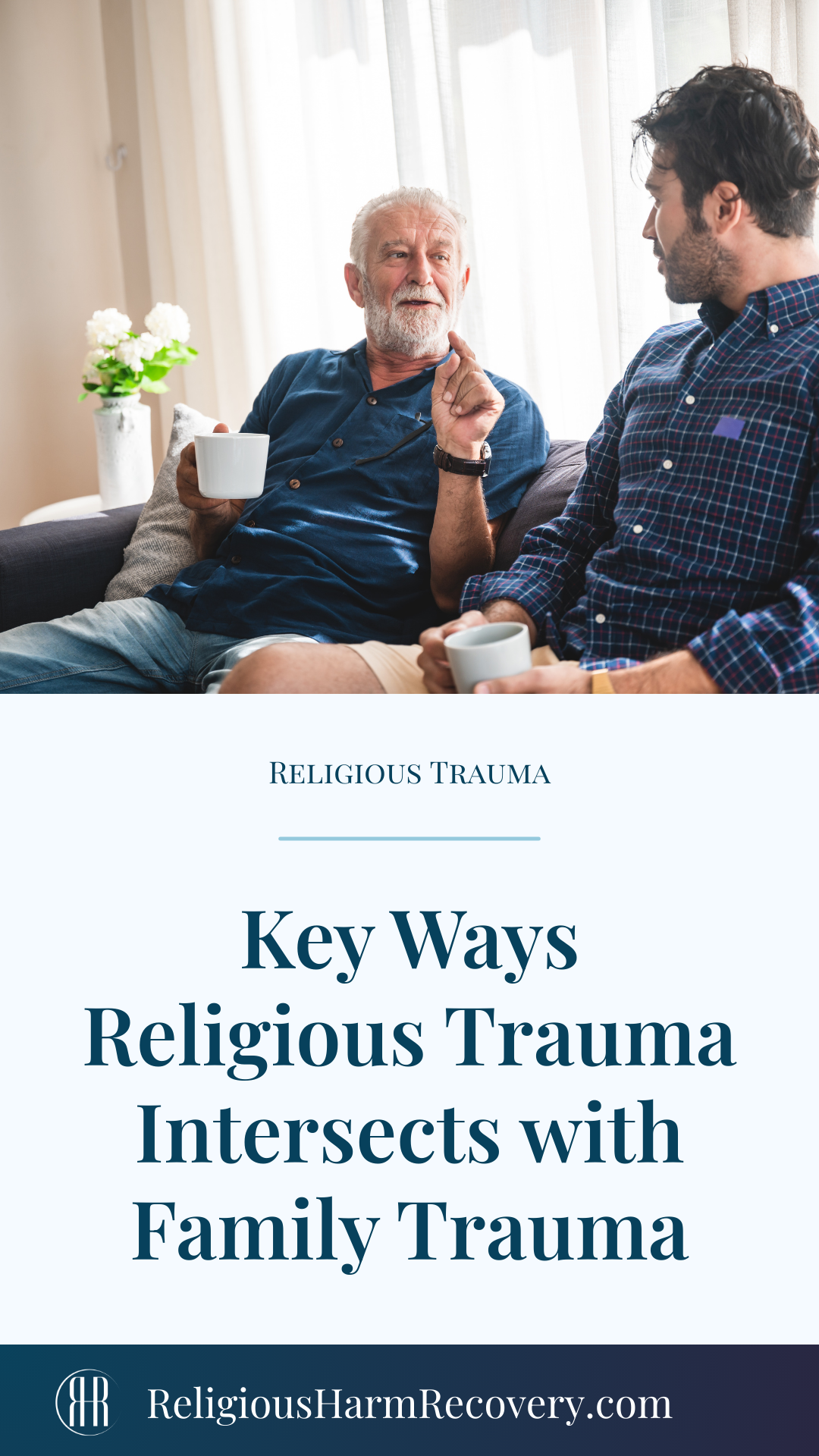Key Ways Religious Trauma Intersects with Family Trauma + How to Break the Cycle

When you’ve been harmed by both religion and your family, it’s natural to want to sort it all out.
Was it my church? Was it my parents? Was it both?
You might find yourself trying to compartmentalize your religious trauma—separating it out from your complicated family dynamics so you can figure out what to focus on first.
But here’s the truth: it’s nearly impossible to separate religious trauma from family trauma.
In many religious cults (also known as high-control religions), the belief system and the family system become fundamentally intertwined.
The same doctrines that influenced your parents’ choices also influenced how they saw you, disciplined you, and responded to your needs.
In this article, we’ll look at how religious trauma and family trauma feed into each other, why that matters for your healing, and 5 steps you can take to start breaking out of this cycle.
What We’ll Be Covering:
Why Religious Trauma & Family Trauma Are Often Intertwined
Religious cults create the infrastructure for family trauma to develop and perpetuate through the generations by normalizing toxic hierarchies of power that are rooted in coercive control.
When these toxic hierarchies are built on a foundation of high-control religious dogma, it’s common for folks to develop not only religious trauma but also family trauma.
Religious cults carefully instruct families that obedience to religious authority matters more than emotional safety, mutual respect, or healthy attachment.
Parents are encouraged to see themselves as God’s representatives in the home, and children are expected to submit without question.
Punishment, shame, and fear become “acceptable” tools for maintaining order, because the system insists that the ends (raising “godly” children) justify the means.
Over time, this turns everyday family life into an extension of the religious system itself.
Rules about gender, sexuality, race, disability, money, and power don’t just show up in sermons or Bible studies—they show up at the dinner table, in how conflict is handled, and in how love and belonging are given or withheld.
When a child’s worth is constantly filtered through religious expectations, the line between “my church hurt me” and “my family hurt me” starts to blur.
This is why so many people who leave high‑control religion later realize they’re not just healing from spiritual abuse; they’re also healing from patterns of emotional neglect, enmeshment, and the authoritarian control that defined their family system.
The same beliefs that shaped their parents’ decisions also shaped the home they grew up in, making religious trauma and family trauma deeply, and often painfully, intertwined.
The Cycle of Religious Trauma in Family Systems
There’s a pretty predictable cycle to how all of this unfolds.
Once you can see that cycle, you can start to break it and heal from both religious trauma and family trauma at the same time.
Here’s how it tends to play out, step by step.
We Seek Out What Feels Familiar
Parents with unhealed trauma of their own often gravitate towards high‑control religions because it feels familiar to the authoritarian or controlling family structure they were probably raised in themselves.
This was absolutely the case in my family.
Both of my parents entered their marriage with significant trauma from their families of origin.
They both had angry, authoritarian fathers and submissive mothers.
Neither of them came into the marriage with healthy coping tools, communication skills, or an awareness of how to handle conflict in a grounded way.
The really sad thing is that, even though both of my parents had very painful childhoods, they were unconsciously drawn back into an authoritarian structure (that of the religious cult) after leaving their families of origin.
The familiarity of control felt safer than the unknown of doing something different.
Religion Provides a Framework
Because my parents weren’t exposed to a healthy model for raising a family, they gravitated towards religion to fill in the gaps of what was missing.
When they discovered a church that assured them that all they needed to do to have a “happy, Christian family” was to follow the doctrine of Evangelical Christianity, they dove in headfirst.
High‑control, high‑demand religions—like the fundamentalist Evangelical churches my family attended—provide a very specific framework for how to live life and parent children.
By joining this group, my parents were able to bypass doing the deeper work of healing their own family‑of‑origin trauma and, instead, adopted a whole new authoritarian structure to guide and direct them.
Church doctrine and leaders became their new surrogate parents, in a sense.
And it worked well for them because they were already used to being embedded in a toxic system of control.
The rules and hierarchies felt familiar, even if they were painful.
The Trauma Cycle Is Reinforced
The catch is that all of this doesn’t heal the original trauma. It actually reinforces it.
As my parents embraced the demands of this system, their original traumas were reactivated over and over again.
This showed up as emotionally detached and punitive parenting practices, which meant my siblings and I became the secondary victims of their unresolved trauma.
At the same time, religious trauma was taking root in us.
Scripture and religious doctrine were often weaponized to exert control, suppress our autonomy, and shut down our critical thinking.
The doctrine doesn’t just shame behavior; it attacks who you are at your core.
In many families, especially for people who are queer, trans, disabled, women, or people of color, this harm is compounded.
This is because the same religious messages that justify control in the home also echo wider systems of sexism, racism, ableism, and queerphobia. Instead of having a safe place to land, these communities are being targeted by multiple layers of oppression at once.
A Trauma Bond Is Formed
When families with unhealed trauma become dependent on the very system that is constantly re‑activating that trauma, they end up forming a strong attachment to it and often defend the very thing that’s harming them.
The idea of stepping away from the rules and structures of the religious cult is terrifying.
Not only do they have no idea how to function outside these parameters (because they never addressed their original family trauma), but they’ve also absorbed fearful messages from the religion itself about what will happen if they leave.
In this setup, the “outside world” is framed as more dangerous than what’s happening inside the group, even if what’s happening inside is abusive or oppressive.
So they stay and the cycle continues.
5 Steps to Help You Break the Religious Trauma Cycle
The hopeful part is that you are not stuck here forever.
You can get out.
And you can heal from the trauma, even if your family stays embedded in the system.
Here are a few steps to help you get started.
1. Educate Yourself
Learning about religious trauma, coercive control, and the impact of high‑control religious environments is essential for understanding the layers of dysfunction and trauma in your family system.
This might look like:
Education gives you language for your experience, which is a powerful first step in healing.
2. Seek Professional Support
Consider therapy or counseling with a focus on religious trauma, complex trauma, or family systems.
Look for trauma‑informed therapists who respect your autonomy and won’t pressure reconciliation or re‑engagement with harmful systems—including your family system if you have chosen to separate from it.
An excellent directory that helps connect people to a religious trauma therapist in their state is the Reclamation Collective Directory.
You can also find out more about working with me HERE.
If therapy isn’t accessible right now, support groups or online communities can also offer validation and other helpful resources.
3. Establish Healthy Boundaries
Establishing healthy boundaries with family members and religious institutions is a key part of breaking the trauma bond.
This doesn’t necessarily mean you have to “cut people off.” But many people need at least a period of time and space away from the source of harm in order to “detox.”
For some people, boundaries might look like:
Boundaries are not about punishing others. They’re about protecting your nervous system while you heal.
You’re allowed to prioritize your safety, even if people in your old system call it selfish or disrespectful.
4. Foster Critical Thinking
Religious cults and indoctrinated parents work hard to shut down your critical thinking skills because they want followers who are compliant and easy to manage.
Because of this, you may have to be intentional about rebuilding those critical thinking muscles.
Some starting points:
Critical thinking is not about becoming cynical or distrusting everything. It’s about having the freedom to decide what aligns with your values, instead of letting fear and control make those decisions for you.
5. Prioritize Self‑Care
In religious cults, the self is chronically neglected in the name of obedience, sacrifice, or “dying to yourself.”
Your needs were likely framed as selfish or sinful.
This means it’s time to start caring for you.
How this can look:
Self‑care is not a luxury or a reward for good behavior. Rather, it’s a necessary part of healing from chronic stress and trauma.
Bringing It All Together
I hope you’ve gathered from reading this article that you don’t have to perfectly map out where religious trauma ends and family trauma begins in order to heal.
In most religious cults, those two threads are woven together on purpose.
What matters more is that you can see the pattern, name how it’s showing up in your life now, and take small, doable steps to step out of it.
Educating yourself, getting support, setting boundaries, rebuilding critical thinking, and caring for your body are all part of breaking the trauma bond.
I recognize that none of this is easy, especially when the people who harmed you also say they “love you” or want “what’s best for you,” or they believe they’re saving you from something worse.
But your nervous system, your relationships, and your future self are worth the discomfort of choosing yourself.
You’re allowed to step out of the systems that tried to break you, even if your family stays. You’re allowed to build something safer, more honest, and more aligned with your values, starting now.
Some Possible Next Steps:
If this article resonated with you and you’re wondering where to go from here, you might consider the following options:
Related Articles:
-
How Religious Trauma Affects Your Nervous System
This article explains how the nervous system responds to religious trauma—fight, flight, freeze, and fawn—why freeze and fawn are often the most common. It also includes how these trauma responses may still be showing up today.
-
How to Tell if You Have High-Functioning Religious Trauma
On the surface, high-functioning religious trauma looks makes it appear as though you “have it all together” while under the surface, this high-functioning persona is being fueled by fear, anxiety, and stress.
-
Religious Trauma Bonds: What They Are & How They Develop
In this article, I’m talking about something I see all the time in my religious harm recovery work: trauma bonds. While this term is often used when discussing abusive relationships, trauma bonds can also form in authoritarian religious groups where…
